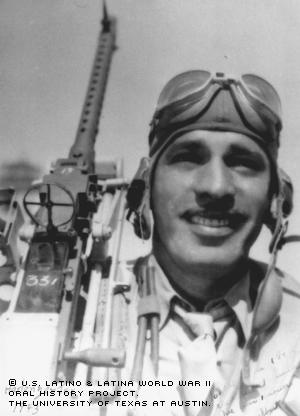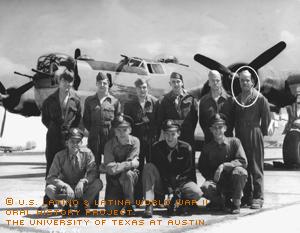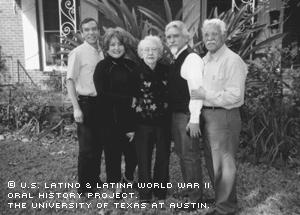


By Tara Wilcox-G.
Alberto Marquez remembers an autumn day in Houston in 1942 when he and a friend went out for hot dogs and, by the time they returned home, they’d decided to volunteer to fight in World War II.
While walking to lunch that day, the young men had spotted the now-famous promotion advertisement of Uncle Sam pointing his finger, saying "I WANT YOU." The two friends began to joke and argue about which one of them Uncle Sam really wanted.
"I said, 'Well, let's go find out who they want!" said Marquez, in his late 20s at the time. The men proceeded to a local Navy recruiting office that day to enlist in military service -- a spontaneous decision that would forever impact their lives.
His friend was accepted into the Navy, but Marquez was rejected because he had two missing molars. He apologized to his friend for having to abandon him and took the advice of the recruiter: Try the U.S. Army instead.
The Army recruiters rejected him, however, for the same reason, and sent him on to the Army Air Forces recruiting office. There, he was told to go to the dentist and return later. As luck would have it, Marquez knew a local dentist, who outfitted him with a dental bridge and plastic teeth.
The dental work was all it took for the Air Force to accept Marquez’s enlistment right away, so he began his nearly three-year service on Oct. 5, 1942.
"I wanted to get away from Houston, but you know what [the Air Force] did?" Marquez said. "They sent me to [Houston’s] Ellington Field!"
Marquez first worked as a file clerk, but he had higher aspirations. When he saw an opening for Officer Candidate School and Gunnery, he quickly applied, and was later sent to Aircraft Gunnery School.
"They were pretty sharp, those guys," said Marquez of the gunners.
He was trained as a side gunner on bomber planes and assigned to the 713th Bombardment Squadron, part of the 8th Air Force's 448th Bombardment Group. He says he requested and received permission to take the nose-gunner position.
"The tail gunner and I were always arguing," Marquez said. "The tail gunner wanted to know where he had been, and I said, 'Well, not me. I want to know where I'm going!'"
Marquez doesn’t recall many Latinos in his unit. He says most of his friends were Anglo, and he was accepted without problems. At 29, he was the oldest in his bomber group, so he was often responsible for maintaining order within the crew.
The crew developed a fond sense of closeness throughout their time together. They traveled the world, which was an education in itself, he says.
Marquez flew 33 missions as a nose gunner in England, Germany and France during WWII. Among the awards he earned for his service were the Good Conduct Medal, Air Medal Eagle and Distinguished Flying Cross.
Born May 24, 1913, in Sanderson, Texas, Marquez was one of seven siblings, three brothers and four sisters born to Espiridion Marquez and Teodola Ochoa Marquez. Marquez’s father worked for Southern Pacific Railroad, while his mother maintained the household.
Marquez says he and his siblings were raised speaking both Spanish and English at home. As a youth, he lived with his grandmother, who raised him along with his siblings and a number of cousins. The children relocated because their parents had to move to San Antonio, Texas, to look for work.
"There were always about 10 boys in the group [living with his grandmother], so we had a good time," said Marquez, who added that he helped his grandfather tend to livestock.
Marquez later attended elementary school in San Antonio, and then junior high school in Houston. He says he dropped out of school after the eighth grade to work for his brother-in-law's delivery service in the early 1930s. He worked in a dental supply shop and delivered packages to a dentist in town for $5 a week.
"I didn't get a chance to even rest or go to the restroom," said Marquez of the delivery job. "They kept me going."
When he complained about the lack of help in delivering packages, his brother-in-law challenged him to quit -- and he did.
Despite the demanding work schedule, Marquez had developed useful connections with the owner of the dental office, so when he told the owner what happened, he was immediately offered a job there, which paid a higher salary. For about three years, Marquez worked odd jobs in the office.
It was the same office that would later perform dental work on him and help him gain entry into the Armed Forces.
Looking back on his wartime exploits as a gunner aboard bomber planes, Marquez recounts numerous war scenes from his past.
"If [all the boats] had been stopped [side-by-side] in the English Channel ... you could walk across," he said. "Same with the airplanes: If you stopped the planes [in the air], you could walk across," said Marquez, pointing out the large-scale military missions.
One of his most painful memories is of seeing American bombers shot out of the sky, he says. His own plane, named "No Love, No Nothing," was shot many times, and he and his crew would sometimes have to limp back to base. He says he once had a vivid memory of having to "bail out" and parachute from the plane, but that it must have been a dream because no one could confirm it.
Marquez was back in the States, in a barbershop at Ellington Air Base in Houston, when he heard the news the war had ended.
After the war, he resumed his job as a shipping clerk at the same dental office where he worked before the war.
"It was unbelievable," he said. "It was just like family again."
In 1935, Marquez married his first wife, Ester Martinez, with whom he had a son, Albert, and daughter, Sylvia. They divorced several years later.
Marquez met his second wife, Sarah Ramon Marquez, at The Havana Nightclub, which he co-owned. The couple married in 1950 and had two sons, Adrian and James.
At the time of his interview, Marquez was 90 and retired. He lived in Houston with Sarah, and had seven grandchildren. He enjoyed doing odd projects around the garage in his free time, and still kept in touch with surviving members of his 10-man gunner crew.
Passing by that Uncle Sam poster on that autumn afternoon was still fresh in Marquez’s memory as a life-changing moment. He said he wouldn't change one thing about his past, including that.
Mr. Marquez was interviewed in Houston, Texas, on April 8, 2003, by Ernest Eguia and Paul R. Zepeda.

